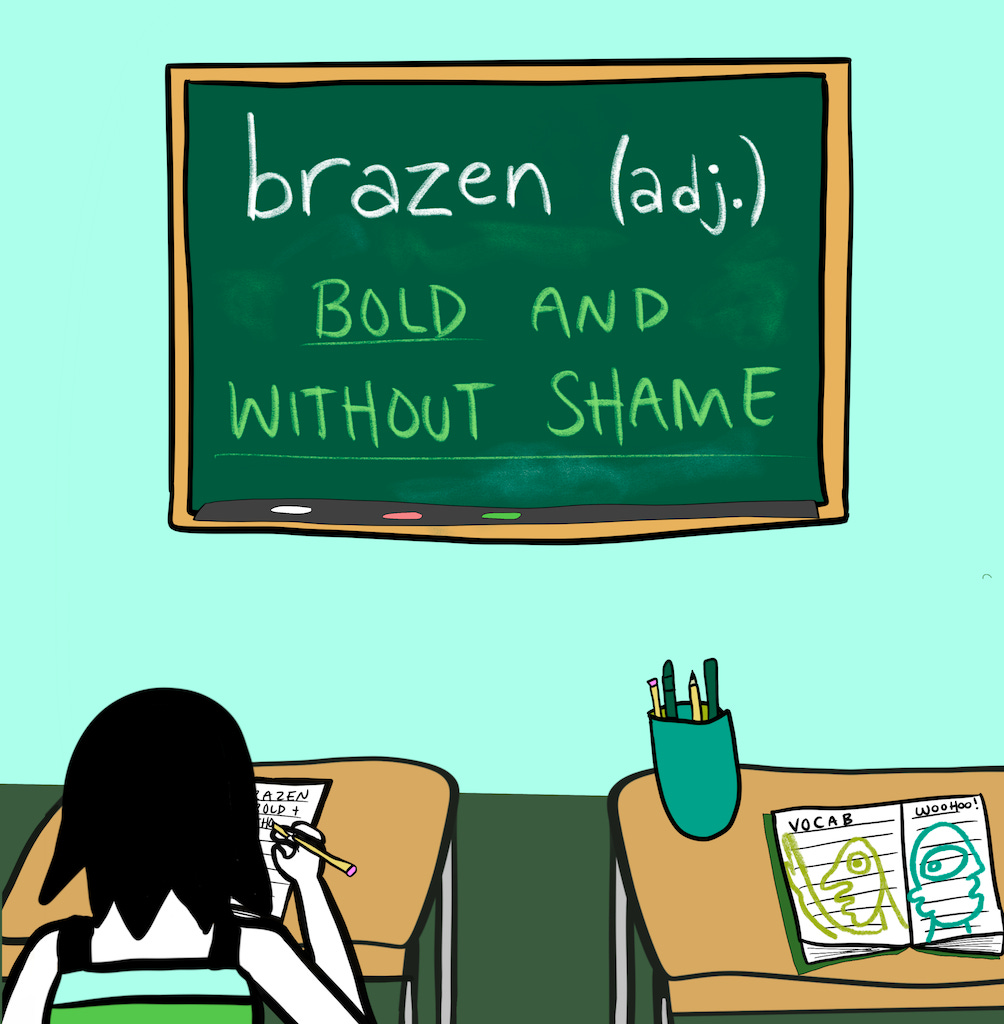Prompt 205. Unapologetically Yours
& a prompt on being brazen by Tatiana Gallardo
Hi friend,
Lately I’ve had to cancel so many plans. Sometimes it’s an important work call, others an eagerly anticipated dinner with a beloved friend. Sometimes it happens in the middle of an event. Recently I went to a luncheon with a bunch of other artists, and between the appetizer and main course, I began to feel sick. In my mind, I tried to bat it away—I told myself, “You’ve been out so little these last nine months, you’re just feeling social anxiety.” But then I started sweating, my hands began shaking, and suddenly I couldn’t deny that something was wrong. So I excused myself and quickly made my way home before the chemo nausea fully took over.
When something like that happens, I usually feel like I’ve done something wrong. It’s easy for me to go into a tailspin of self-doubt, to get caught on a loop of self-criticism: Are you really so sick you can’t do this? You’re not going to have any friends if you keep canceling plans. What’s wrong with you? You just need to buck up.
I apologize a lot, like many women do—half a dozen times a day out loud, double or triple that in my head. If someone bumps into me, I apologize. If they knock over my coffee, I apologize. If someone else’s dog lunges aggressively at my dog, I apologize. If I’m sick and need to cancel plans, the first thing I do is apologize: “I’m so sorry but…”
Apologies have an important social function, helping smooth relationships, creating a sense of harmony. But when apologizing is your reflex, it becomes a default stance toward anything you encounter: retreating, stepping back, rather than owning your space and your needs. It’s a kind of self-erasure.
As a counterbalance, I’ve been thinking about our Studio Visit with Lena Dunham back in December, where in our conversation about self-care, she issued an assignment to everyone: Cancel at least one plan this week—and don’t you dare feel bad about it. Lena said she was the healthiest she’d been since her chronic illness made itself apparent about 10 years ago, and she’d gotten there because she stopped feeling shame around asking for what she needed.
So the question I’ve been asking myself lately is, “What would be most loving—to myself or my body—right now?” Whether it’s a slow stroll with River or an afternoon nap or clearing my evening, I’m working to accept the answer, to tend to it without guilt. If there’s one word I’m trying to aspirationally embody these days, it’s unapologetic.
Today we have a poignant essay and prompt from Tatiana Gallardo, a writer and illustrator and Isolation Journals community member. I first encountered Tatiana’s work at the beginning of our last 100-day project, which for her unexpectedly morphed into a 200-day project. In her essay, she writes about how one word changed her relationship with the world, allowing her to take up her rightful space, boldly and without shame.
Sorry not sorry,
Suleika
Some Items of Note—
On Sunday, August 28, from 1-2pm, we’ll be meeting at the Hatch, our virtual creative hour for paid subscribers. You can learn more here!
We’ll be sending out a Dear Susu in the next few weeks. Have a question for Suleika? Send it to suleika@theisolationjournals.com with the subject line “Dear Susu.”
Last week we began piloting an exciting new community offering called Threads, which is kind of like a giant group chat for the Isolation Journals. It’s free and available to anyone with an iOS smartphone or tablet. To join us, get the app below!
Prompt 205. Brazenface by Tatiana Gallardo
I remember the first time I heard the word “brazen” in English class. I was 12, timid, and struck by the meaning of the word and its power. Bold and without shame. It felt like something I could never be: audacious, capable of doing whatever, without worry. Taller than my entire class and most of my teachers, I was scared to stand out anymore than I already did. I had grown comfortable in the corner. There, I could soften myself and my size. I preferred to be quietly creative and studious rather than loud and large.
With age, I became more confident about my height, thankfully—but I never dared to be brazen about my dreams. When I turned 24, I still felt the 12-year-old me’s fear. I had graduated college, gotten the job I hoped for, felt generally happy, yet I felt like I was still in the corner: afraid to speak up, to take risks, to pursue what I most desired—which was to shamelessly share my creative work with the world.
As I entered 2022, I wanted to push myself to overcome fear in every aspect of my life: professionally, personally, creatively. But I needed fuel. I needed inner strength. I needed to be, somehow, brazen. So I started letting the word I most remembered inspire me rather than haunt me. Every time I was about to do something scary—heart pounding, chest tightening, the worst case scenario flashing before me—I’d tell myself: Just put on your brazen face.
At first, I started saying it as I geared up for small moments of courage, like killing a spider or telling someone “no.” Just put on your brazen face. Then, the mantra appeared as I braced myself for bigger, scarier moves towards my dreams. Like pitching an essay. Publishing an illustrated story. Leaving my job to focus on my creative work. Just put on your brazen face, Tati. There’s conviction in the command, but I say it with gentle love. It’s a reminder that I am capable of courage. That I can summon my secret strength.
Aside from the subtle straightening of my spine, my appearance doesn’t change when I put on my brazen face—my face quite literally looks the same. But internally? There’s a wave of composure. A rush of confidence. A release of the brazen that’s always been there, ready to break through.
Your prompt for the week:
Write about the word you wish to embody. Where did you first learn it? What does it mean to you? Who does it allow you to become, what does it allow you to do?
If you’d like, you can post your response in the comments below, in our Facebook group, or on Instagram by tagging @theisolationjournals.
Today’s Contributor
Tatiana Gallardo is a Cuban-Ecuadorian-New-Jerseyan writer and illustrator. You can subscribe to her newsletter, Brazenface, which chronicles her year facing all her fears—like embarking on a one-way ticket to Europe this month. She’s also on Instagram.
For more paid subscriber benefits see—
On Creating Beyond Fear, a video replay of our Studio Visit with the dazzling Elizabeth Gilbert
Read Me, See Me, Like Me, an installment of Dear Susu where she tackles the question, “Why do I continually write for my words to continue to sit unused, lonely?”
On Habit-Stacking, a short essay by Suleika on ways to infuse your daily creative practice with novelty














I came upon this quote that I resonated with that gives me the courage to help me have new male and female friends, because most of my dear friend have died. The quote is : “A loving heart is a magical magnet for magnificence”. Sherri Rosen
"Beginner..." I first heard the term "Beginner's Mind" at a Summer Seminar for Grad. School. When I was young, being a "Beginner" was not interpreted by society at large, or my peers as a positive place to be. It has come to mean liberation for me, a battle cry of victory. "I am a Beginner!" I begin things, sometimes I don't like the activity, the book, the whatever, and I give myself the permission to leave it. Sometimes, I am fulfilled and excited by the newness and continue on. I love the freedom that accepting in "Beginner Status" provides me now. Sometimes, it's scary, but as someone with lifelong anxiety, I am a Pro at the Anxiety, and yet a Beginner at accepting it and committing to a small action to lessen it.